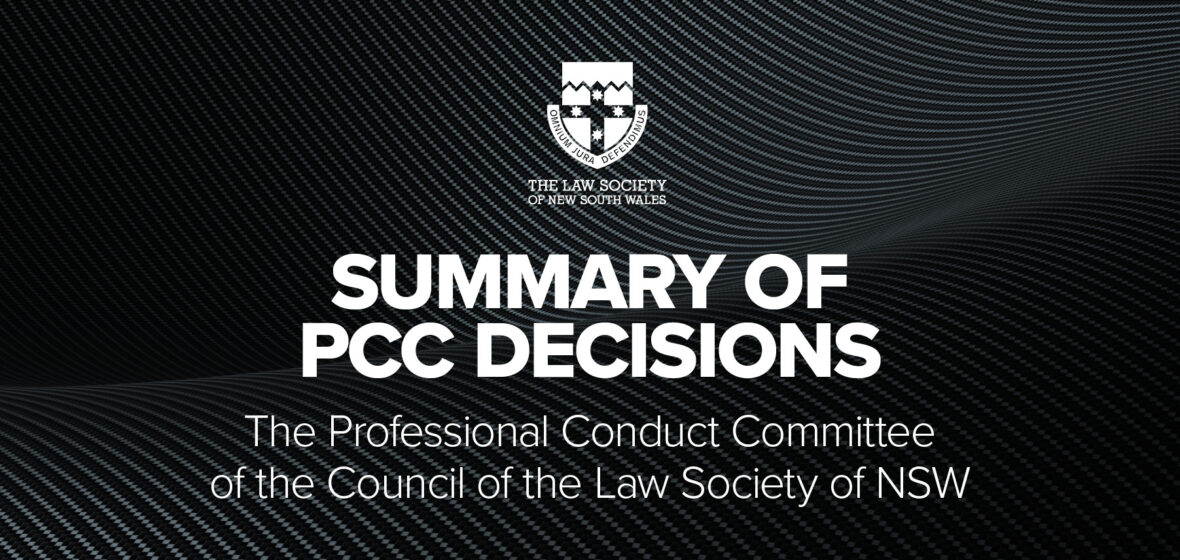The Professional Conduct Committee (PCC) of the Council of the Law Society of NSW (Council), under delegation from the NSW Legal Services Commissioner and the Council, deals with complaints referred to the Council by the NSW Legal Services Commissioner.
There were seven matters determined this quarter, which involved the following conduct issues:
- the non-payment of Counsel’s fees;
- making misleading statements;
- misleading or intimidating a person – breach of rule 34 of the Legal Profession Uniform Law Australian Solicitors’ Conduct Rules 2015 (Conduct Rules);
- causing a trust account deficiency – breach of s148 of the Legal Profession Uniform Law (NSW) 2015 (Uniform Law); and
- a failure to disburse funds paid to a trust account in accordance with instructions.
The following are some key principles emerging from the decisions.
Misleading Statements
One of the matters considered by the Committee this quarter concerned two related complaints about a solicitor making allegedly false/ misleading statements.
In relation to the first complaint, of interest from the Committee’s decision was its handling of the solicitor’s claim that they did not understand the meaning of the term “disqualified person” in the Uniform Law or that law practices are prohibited form employing such persons. The solicitor had said the lack of understanding resulted in the misleading statement made to a regulator.
The Committee however, formed the view that the submission that the solicitor did not know or understand the term “disqualified” was not satisfactory, given the solicitors responsibility as Principal of a Law practice.
In relation to the second complaint, the solicitor filed an affidavit in court proceedings which contained a chronology that the complainant alleged contained false and misleading statements to the Court.
While the court proceedings were eventually discontinued, the Committee considered that this did not excuse the misleading statements in the solicitor’s affidavit. Moreover, the Committee found that a ‘motive’ for making a misleading statement, does not need to be established, to enable a finding that a misleading statement has been made; ‘motive’ (or lack thereof) is irrelevant.
A solicitor has a duty to be frank and honest in all dealings. In failing to do that, the Committee found the conduct amounted to unsatisfactory professional conduct and determined that the solicitor be:
- reprimanded;
- pay a fine of $2,500; and
- undertake and complete legal ethics training.
Breach of Trust Account Obligations
There were a couple of matters this quarter that concerned breaches of Trust Account requirements. One matter involved the solicitor causing a trust deficiency of over $10,000 and the account to be overdrawn for a period of 335 consecutive days.
Section 148 of the Uniform Law establishes that a law practice, a legal practitioner or any other person must not without reasonable cause, cause a deficiency in any trust account or trust account ledger or a failure to pay or deliver any trust money.
The key concept of trust money is that it does not “belong” to the law practice. It is money that is entrusted to the practice in the course of or in connection with the provision of legal services.
Trust money does not “belong” to the law practice until the provisions of the Uniform Law and the Legal Profession Uniform General Rules 2015 (General Rules) are duly complied with, usually this requires that (pursuant to rule 42):
- Legal services are provided;
- An invoice be provided to the client;
- The client be given 7 days to object to the amount specified in the invoice; and
- The funds are duly transferred from the trust account into the office account.
The Tribunal has considered the breach of s 148 of the Uniform Law and rule 42 of the General Rules in the matter of Council of the Law Society of New South Wales v Diaz [2021] NSWCATOD 9 (Diaz). In Diaz, the solicitor had drawn a cheque in favour of the practice prior to the expiry of 7 business days. This action breached rule 42 and as the Tribunal noted, frustrated the overarching protective purpose of the rule.
In the matter before the Committee, it resolved that the solicitor was found to have engaged in unsatisfactory professional conduct. The Solicitor was reprimanded, ordered that they pay a fine of $2,500 and that they complete a Trust Accounting course.
Holding deposit money in conveyancing transactions was the subject of an article in the last edition of the ESQ.
Failure to disperse funds in accordance with instructions
Another matter determined this Quarter concerned a solicitor failing to disperse funds in accordance with instructions from the relevant person on whose behalf they were holding the money.
The complaint centered around a conveyance where a purchaser paid an amount into the solicitor’s Trust Account as the deposit for a sale. The solicitor was acting for a vendor company.
The solicitor released the deposit without the Purchaser’s authority or direction to do so and with the sale not having been completed.
Section 138 of the Uniform Law, requires that (except as otherwise provided) a law practice must:
- hold trust money deposited in the law practice’s general trust account exclusively for the person on whose behalf it is received; and
- disburse the trust money only in accordance with a direction given by the person.
It is key that before a solicitor disburses any money from their Trust Account, they are clear on who they are holding the money for
The Committee resolved that the solicitor be reprimanded and that she complete training cases in Trust Accounting and in Corporate and insolvency law.




